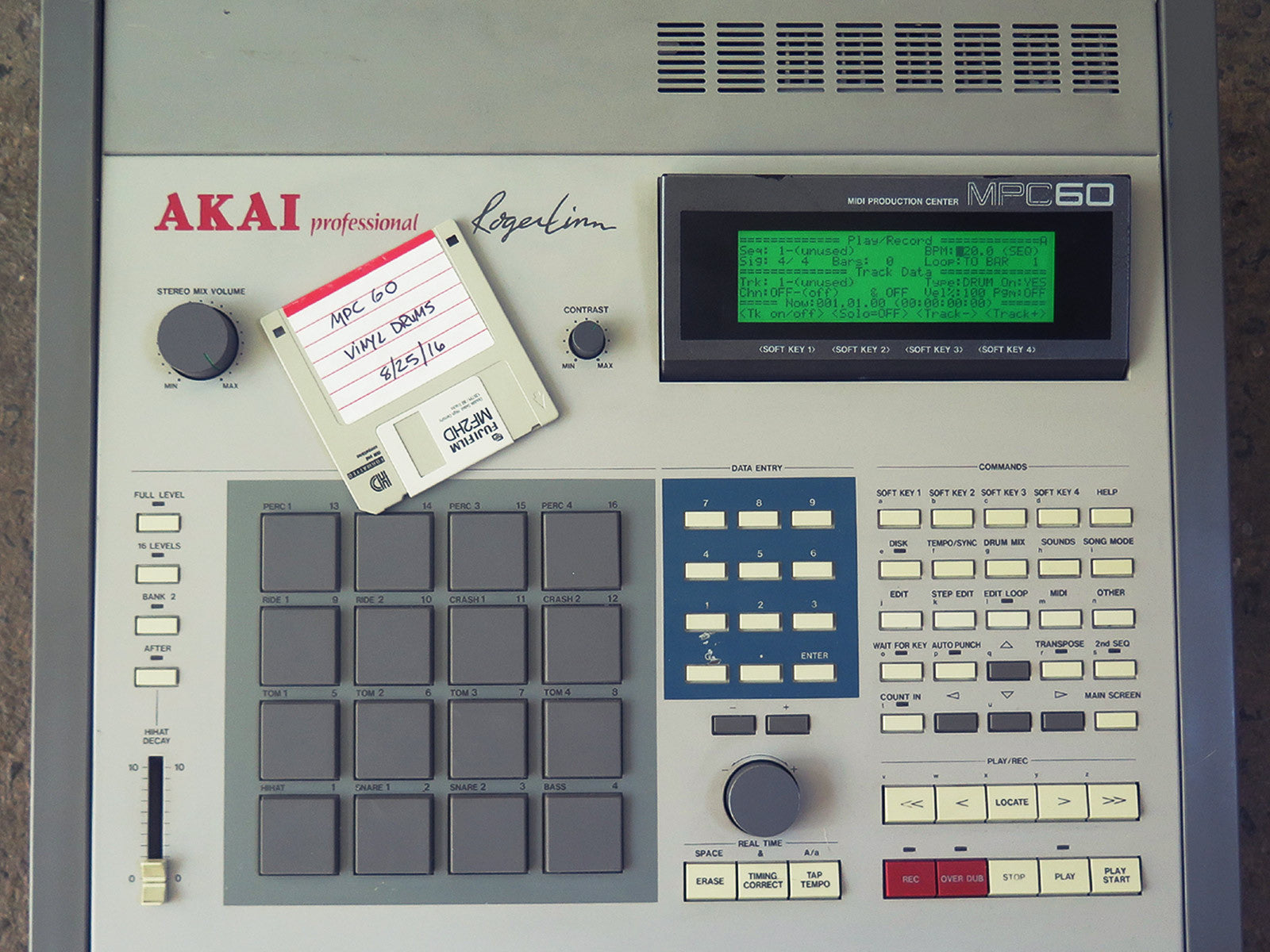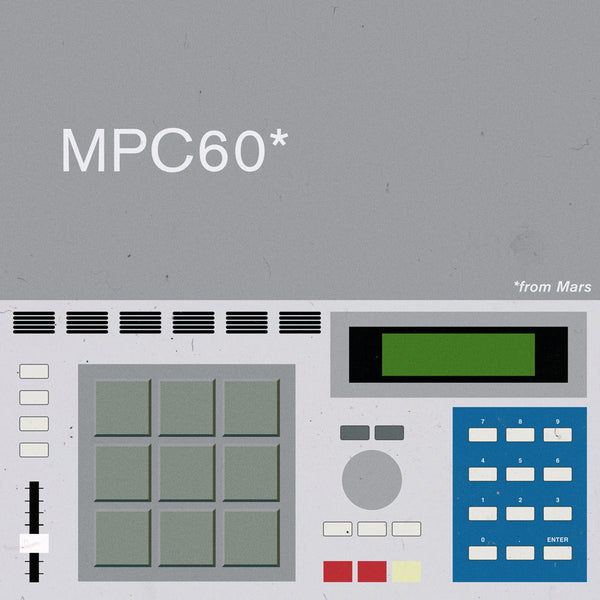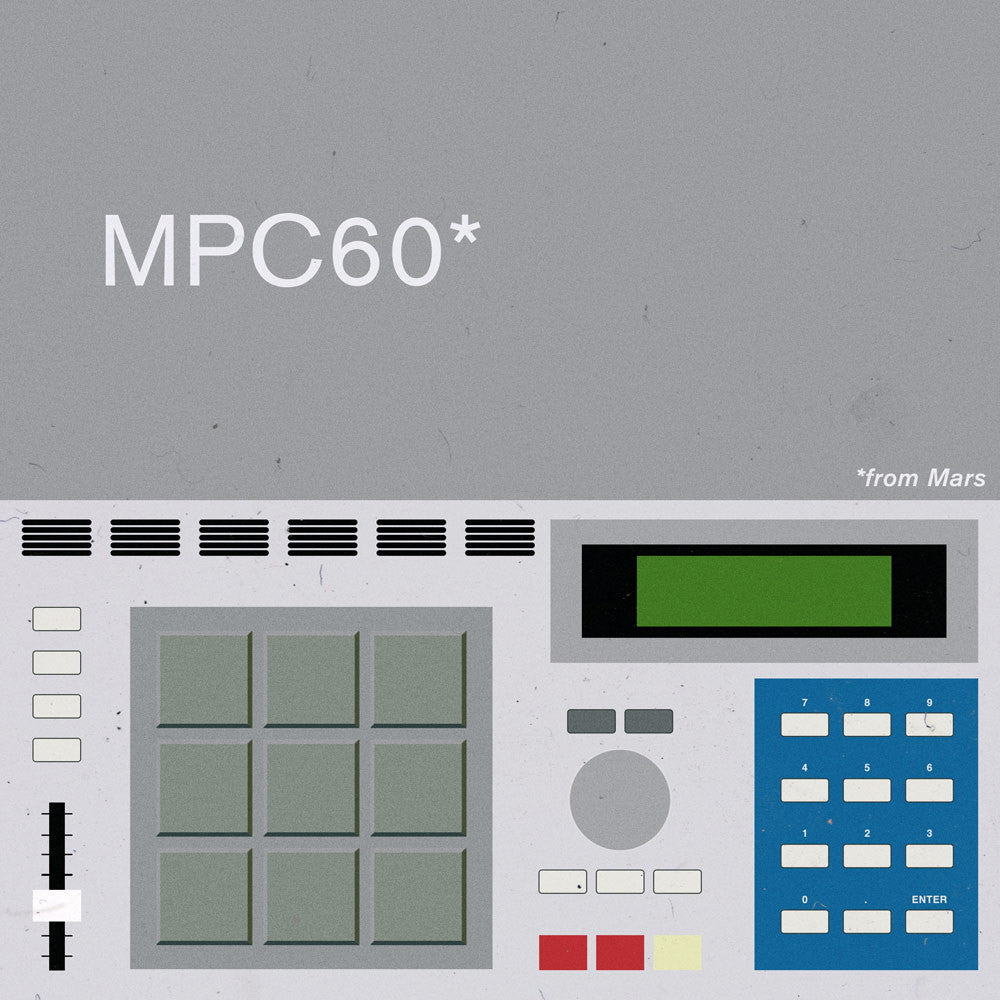MPC60 FROM MARS
$29.00 $14.50
The Fattest & Warmest 12bit Drum Sampler
Designed by Roger Linn in 1988, the MPC60 is one of the best sounding samplers of all time and, (along with the SP1200), has shaped the sound of classic 90s hip hop, R&B and house music with its unmistakeable grit, warmth and punch. And despite looking like a cash register and having a resolution of only 12bits, this sampler still sounds better than any modern equivalent boasting higher specs. Quite simply, what you put into it comes out sounding better.
Usually when you sample something (an analog drum machine, for instance) the samples are less desirable than the drum machine itself. But with the 60, you can actually make an 808 or 909 sound better (well, different) - hardening it, fattening the low end, crunching up the midrange and creating a hard hitting sequence with an amazing shuffle. And while the debate over the best MPC continues, the 60 is undoubtedly the best sounding, with its instantly recognizable and classic color it imparts on everything that passes through it.

What we Sampled
Naturally, drum machines were the first things to get sampled into this thing - and we gravitated towards classic and oddball sounds. A lot of MPC60 libraries run pre-made samples into the 60 - but there is something really special about going *directly out* of an 808, 909, CR78, 606 and 707, straight into it. We also hooked up the SH101, Arp2600, and even SP-1200 for some hot sampler on sampler action.
To get a dustier vibe, we went record digging, grabbing everything from old school funk breaks, bonus beats and boogie 12"s to (pre-software) early 2000s minimal techno records. Our intention was to create our own drum machine samples by hardening them through the 60. Recording directly from a super clean phono stage (Ortofon 2M Red into a Musical Surroundings Phonomena) worked perfectly with the 60's gritty converters and we ended up with a collection of spicy and complex drum samples.
Finally, since the groove of the MPC is just as unbeatable as the sound, we captured every quantization setting from 50% - 75% as midi grooves for you to use in your own productions. The following is composed entirely from the Ableton drum rack with no additional processing, set to that unbeatable 60% shuffle:
Trick #1 - Clipping the Converter
A big part of the 60's vibe is found when overdriving the input converter to taste, which, on the right drums, sounds really warm and gives you loudness, more sustain and a lower noise floor. The 808 kicks, for instance, sounded great clipping the attack. You can also take a funk snare and harden it into a 90s hip hop sample like no compressor or plugin can. But we also took care to *not* clip a lot of sounds, as many of the MPC60 packs out there seem to only have clipped sounds, which gets tiring quickly.
Here's a slower jam featuring a huge, saturated modded 606 kick (coming in around the 30 second mark):
Trick #2 - Capturing the Pitches
There's something really special about old school hardware drum tuning, and we wanted to showcase it majorly. For every sample we recorded up to 19 pitches, to reveal that sweet, vintage aliasing and fatness. This means you can choose which hardware tuning you'd like instead of pitching it digitally in your DAW, which will majorly affect production in a positive way.
In Ableton, this hardware pitching is incorporated into a massive 2800 sample drum rack in which you can select any drum sound and then "hardware pitch" it via a macro that selects the correspondingly pitched sample.

The Processing
There are a couple pieces of studio gear that are majorly featured on this sample pack. First, the Reddi Tube DI - which is one of the warmest and deepest sounding DIs I've ever heard (it seems to add a lower octave of bass). Coupled with the inherent warmth of the MPC60, this gave us extremely warm low end, especially on kicks, and a more finished tone overall.
The next major piece of gear was our trusty Otari MTR-12 1/4" mastering reel - which almost all drum hits were recorded to. This seems subtle while sampling, but the tape gives the drums an unmistakeable analog punch and slight color.
The final two pieces of gear that imparted a major tone on this pack were the API 560 EQ and SSL expander / gate. While many of the drum machine hits were not EQ'd, the vinyl was processed quite heavily. The API was used for adding presence and air (think Questlove's rim shot) while the SSL was used after tape to add attack and control the tails of vinyl drum hits, effectively making them punchier and closer to drum machine samples.

Order of Operations is Everything
Perhaps the most interesting processing revelation wasn't a piece of gear, but the order in which the gear was used. After a little trial and error we found that processing the samples on their way into the 60 gave us superior results than processing the outputs of the 60. This makes sense if you think about it - take a static, 1 note kick drum - find the frequencies relative to that sample that you'd like to EQ (boost the fundamental), and record it into the MPC. Now, when it gets re-pitched, that fundamental frequency is boosted relative to every pitch you're recording. If you were to instead EQ those 19 pitches after sampling, you wouldn't be able to find a one size fits all EQ setting, because that fundamental frequency would be changing at every pitch along the way. Needless to say, this impacted the samples in a very beneficial manner.

In the End
Truthfully, sampling on the 60 can be a quite painful process (thank god there's an arm rest). There is no visual waveform display and you find the start point of every sound by turning the data wheel one sample at a time. It is time consuming and (after 100 hours) soul-sucking. But to say it was well worth it is an understatement. The drums are fat, thick and analog sounding, full of 12bit artifacts and noise that sound beautiful when tidied up a little with filters.
The drum machine samples compliment the vinyl perfectly, and when used in combination with the hardware pitching and those killer MPC grooves, your production starts to sound truly incredible. So enjoy the amazing sound of this machine without all the drawbacks of its antiquated workflow!
Contents:
- (2800) 24bit WAV MPC60 Samples
- Bass Drum, Snare, Rim, Clap, HH, Cabasa, Percussion, Tom, & Cymbal Hits
- Samples include: Modded 606, 707, 808, 909, CR78, Rhythm 700, SP1200, SH101, Arp 2600, Vinyl & More
- (20) pre-made 16 Hit Kits for fast loading
- 26 MPC Groove Midi Files
- Ableton includes 1 master drum rack containing all samples, with sample select and hardware pitch macros, 3 drum racks containing pre-made kits
- Kontakt, Logic & Reason include: 18 individual hit instruments + 5 pre-made kit instruments
- Maschine, Battery & FL Studio include: 20 pre-made kits
- MPC1000 & MPC2500 include: 20 pre-made kits on 4 MPC Programs
- 208 MB Unzipped
Ready For:
- Ableton Live 9.7+ (Not Intro)
- Kontakt 5.6.5+ (Not Kontakt Player)
- Logic 9+
- Maschine 2.6+
- Reason 8+
- Battery 4.1.5+
- FL Studio 20.8+
- MPC1000 or MPC2500
- 24 bit WAV Compatible DAW or Sampler
Contents:
- (2800) 24bit WAV MPC60 Samples
- Bass Drum, Snare, Rim, Clap, HH, Cabasa, Percussion, Tom, & Cymbal Hits
- Samples include: Modded 606, 707, 808, 909, CR78, Rhythm 700, SP1200, SH101, Arp 2600, Vinyl & More
- (20) pre-made 16 Hit Kits for fast loading
- 26 MPC Groove Midi Files
- Ableton includes 1 master drum rack containing all samples, with sample select and hardware pitch macros, 3 drum racks containing pre-made kits
- Kontakt, Logic & Reason include: 18 individual hit instruments + 5 pre-made kit instruments
- Maschine, Battery & FL Studio include: 20 pre-made kits
- MPC1000 & MPC2500 include: 20 pre-made kits on 4 MPC Programs
- 208 MB Unzipped
Ready For:
- Ableton Live 9.7+ (Not Intro)
- Kontakt 5.6.5+ (Not Kontakt Player)
- Logic 9+
- Maschine 2.6+
- Reason 8+
- Battery 4.1.5+
- FL Studio 20.8+
- MPC1000 or MPC2500
- 24 bit WAV Compatible DAW or Sampler










